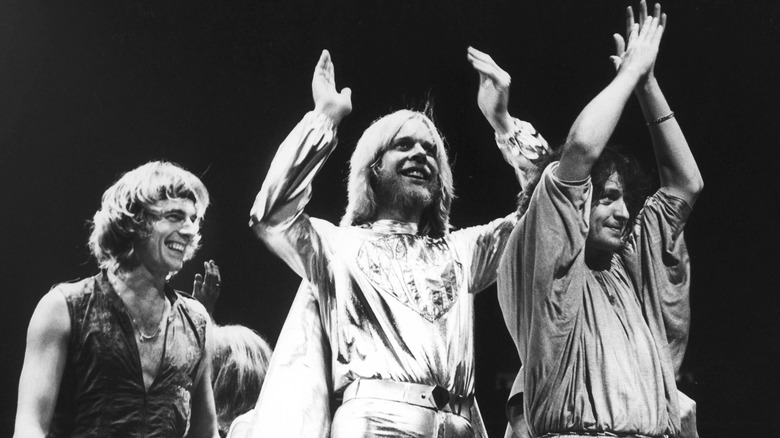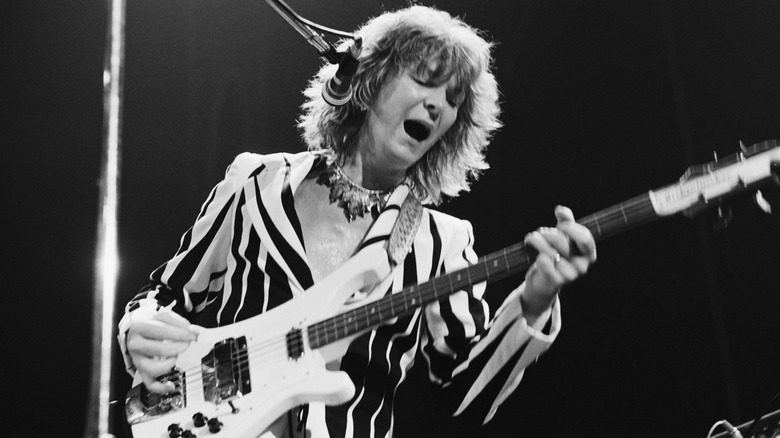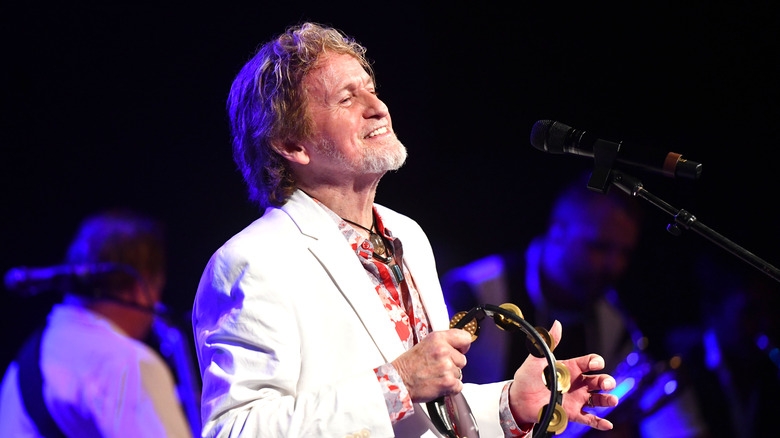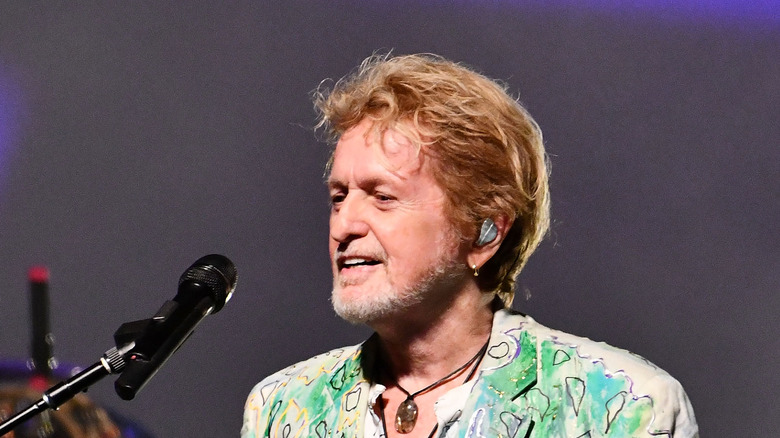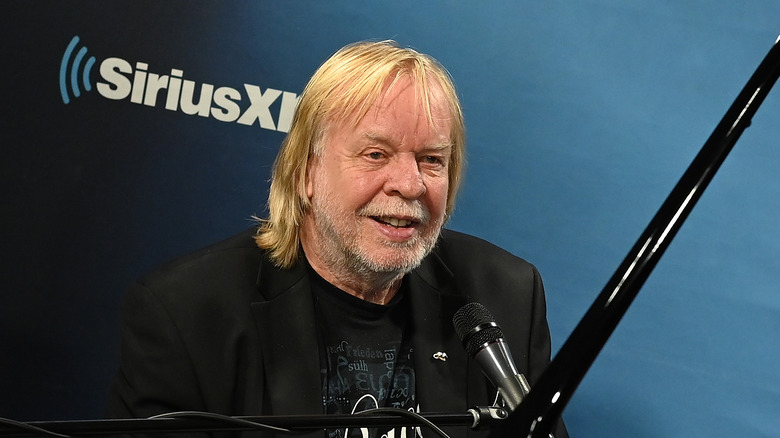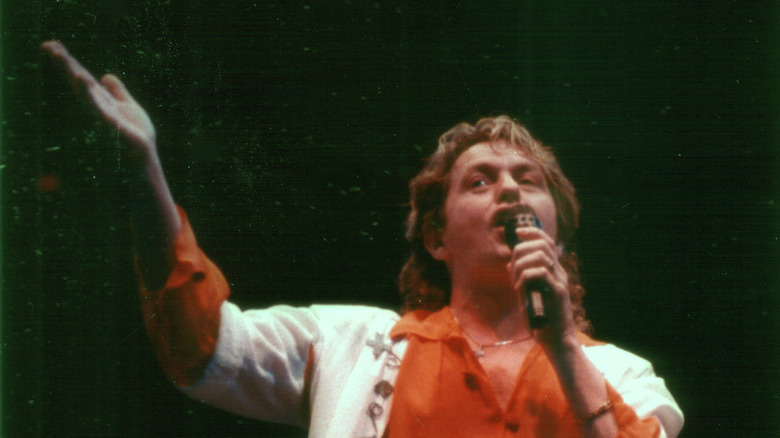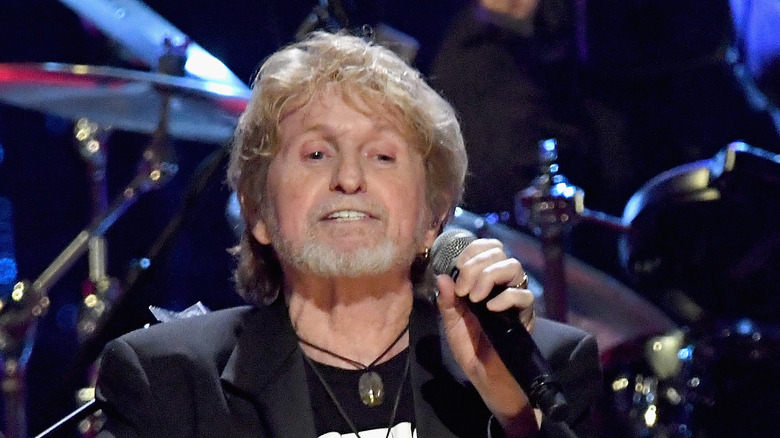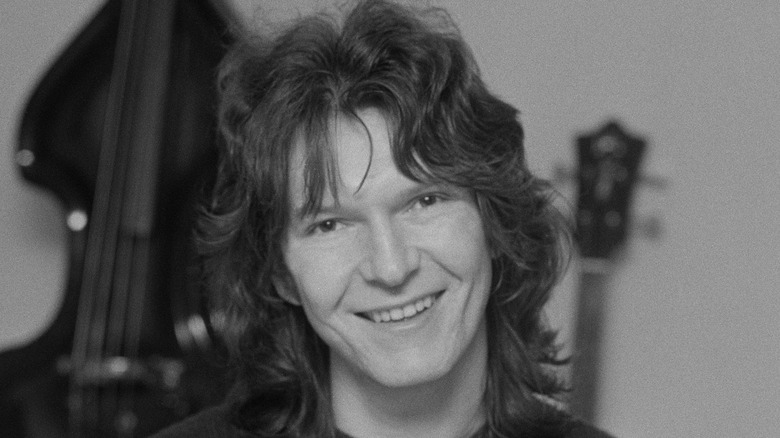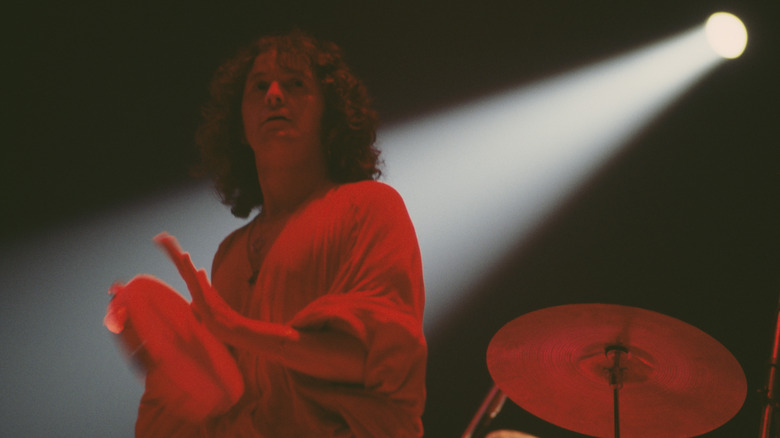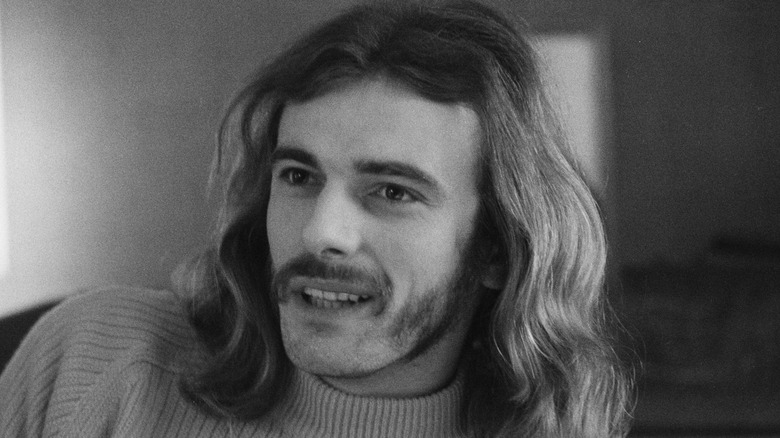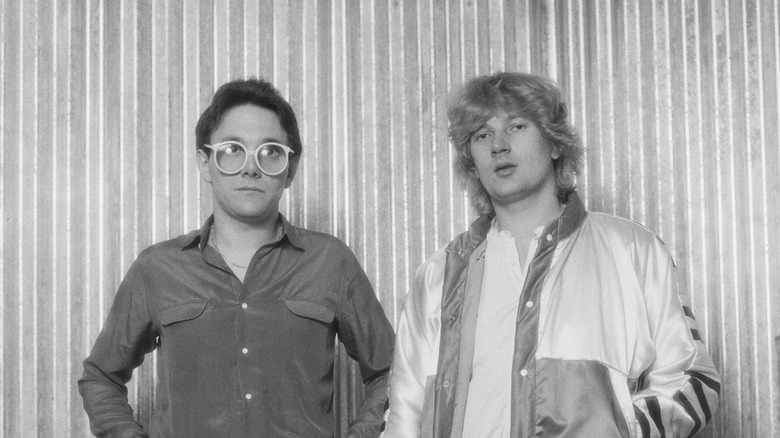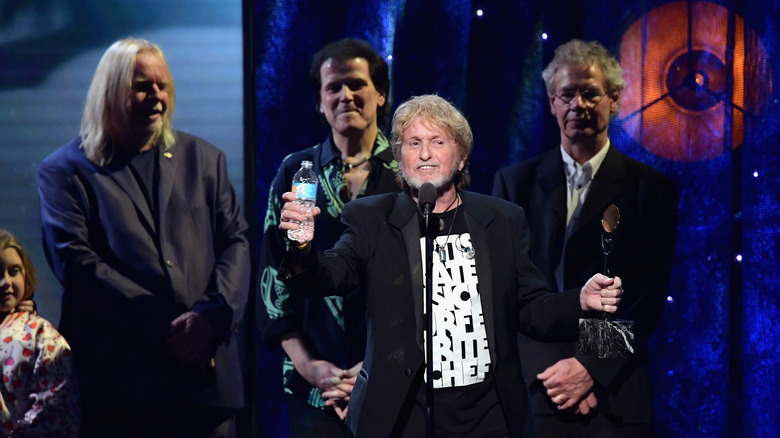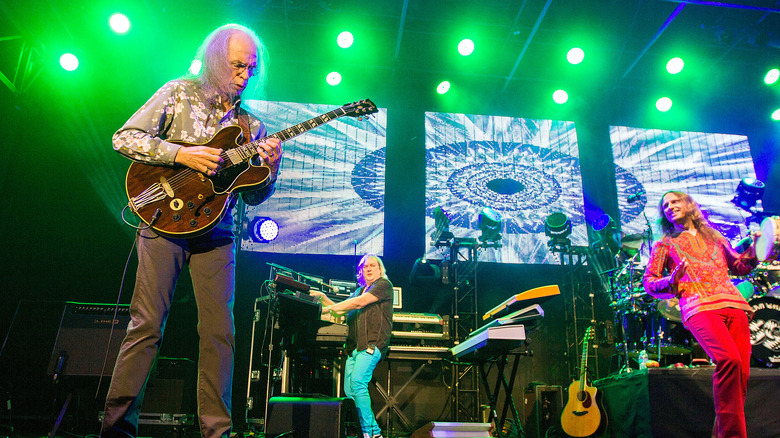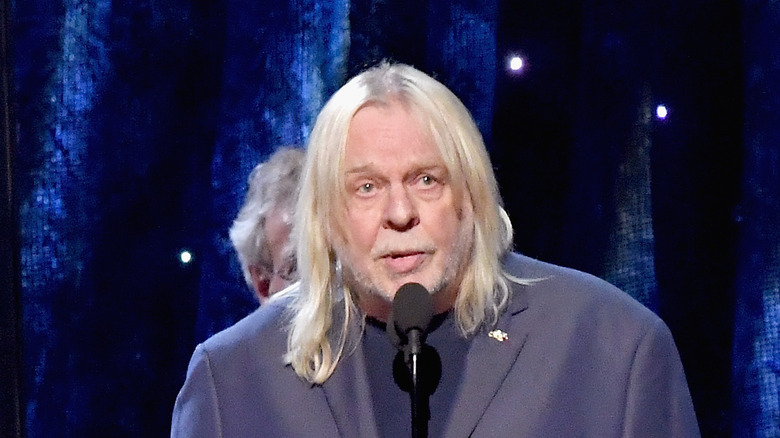The Untold Truth Of Yes
"Owner of a Lonely Heart" is basically crude radio pop compared to everything else Yes has done. The band remains, to this day, one of the most intricate, intriguing, and flamboyant rock bands out there. They borrowed sounds from Igor Stravinsky, Jean Sibelius, and The Beatles, as per The Pitch. And yet, their sound is truly authentic, to the extent that "progressive rock" doesn't fully encapsulate their genre. Guitarist Steve Howe praises Yes fans for being "able to distinguish the textures and the harmonies and the discords and the dynamics and the dramatic and the humble and the soft and the low and the quiet," and drummer Bill Bruford just says that "some of it's fast and some of it's slow" (via their 2017 Rock and Roll Hall of Fame speech). So what's their secret?
Yes have gone through thick and thin to stay together, and even when it seemed like they did, the truth was a little bit more complicated. As Rolling Stone shows, the band went through several line-ups, fell victim to their own policies, and at one point, there were even two Yeses, struggling to co-exist. And of course, there was a time Rick Wakeman stopped a live concert to eat a chicken curry (via Chris Welch's "Close to the Edge: the Story of Yes"). Without further ado, here is the untold truth of Yes and (almost) everything that makes them such a special band.
Yes had a mediocre start
You can't say Yes without saying Jon Anderson. He was their frontman, composer, and lyricist, as Songwriter Universe confirms. Yet it wasn't Anderson who laid the foundations for Yes. It was Chris Squire, an excellent bass player and, according to his bandmates, "Fish" (he spent one too many hours in the bath tub, as per Chris Welch's "Close to the Edge"). Squire formed a band called Mabel Greer's Toyshop in London, in 1968, with guitarist Peter Banks.
Squire and Banks were already talented musicians, but the band didn't leave much of an impression on its listeners. Jack Barrie (a professional caterer who ended up becoming the Yes manager) commented, "There was nothing outstanding about them. You wouldn't stand and watch them and get a shiver of excitement down the spine ... The musicianship in a band like Mabel Greer's Toyshop was very good but it was obvious they weren't going anywhere" (via "Close to the Edge"). In the end, it was Barrie who introduced Anderson to Squire, and the rest is history.
Yes have never been sex, drugs, and rock 'n' roll
Most rock bands that started out in the 1960s had their fair share of problems with substance abuse, groupies, and even getting arrested. Yes had none of that, and for Jon Anderson, this is the main reason they have survived for so long, as per Chris Welch's "Close to the Edge," Anderson likened making music to a crusade, with the band endeavoring not to fall into the stereotypical sex, drugs, and rock 'n' roll cliche but that rather purposefully be more spiritual and create a good message inline with the meaning of the word "yes."
Interestingly enough, this is not a vision that Anderson developed with the passing of time. As soon as he formed Yes with Chris Squire, he decided that he wasn't going to make easy, popular music, or become famous. In a 1997 Yes documentary, Anderson described his lack of interest in pop music from the get-go: "We weren't interested in trying to make, sort of pop, commercial records because there was enough going on in that world and I actually [was] 27, I felt I was too old to be in a pop band anyway." Not only did Yes not adhere to the commercial sound, they never became rockstars in the most popular sense of the word.
Jon Anderson fell victim to his own policy
Perhaps above all else, Yes is famous for its exceptional musicians who always strived to evolve professionally through the years. According to drummer Bill Bruford, the musicians continuously developed their skills partially because there was competition within the band (via a 1997 documentary). This meant not only that the band members were all getting better but that anyone could get replaced at any time. This was Yes' famous revolving-doors policy.
As Bruford explains it, "If you'd find a better person, you'd have them in the band." There was no severance pay for musicians who would be fired and replaced, so everyone was under constant pressure to play perfectly. While Jon Anderson was one of the fiercest advocates of perfectionism within Yes, in 2008, he fell victim to the very policy he'd been supporting for decades. As Rolling Stone reports, Anderson got sick four years prior and was still in recovery when Chris Squire lost his patience and wanted to tour again. So he replaced Anderson with Canadian singer Benoit David. As per Louder, in 2012, Squire then replaced David with another singer, Jon Davison. Anderson has never officially returned to Yes after this, but he has toured with Yes members under the moniker "Yes featuring Jon Anderson, Trevor Rabin and Rick Wakeman."
Rick Wakeman once stopped a concert to eat a curry
Rick Wakeman is one of the most prolific piano and keyboard players in rock history, but he is also a great lover of comedy, as he often shows it on stage (via YouTube). However, it wasn't just a comedic act when he decided to interrupt a show and enjoy a chicken biryani mid-song during Yes' "Tales from the Topographic Ocean" tour in the mid-1970s. According to Chris Welch's "Close to the Edge," the partial reason for this interruption was Wakeman protesting against the vegetarian food backstage, which was imposed by Jon Anderson and Steve Howe.
But the real reason, Welch says, was the huge amount of pressure the whole band was under as a result of Anderson's iron fist. Wakeman was protesting against a much more serious aspect of the band's dynamic. Anderson himself agrees he was a pretty fierce leader but gives a justification for it in the 1997 documentary: "I've been taunted for being a sort of a Napoleon figure within the band, but that's because I don't play a guitar. I don't play a drum. I can only speak or physically sing ideas to everybody and come up with a passionate thought process."
The band's name reflects Jon Anderson's view on life
When Jon Anderson joined forces with Chris Squire, the latter was playing with Mabel Greer's Toyshop. This might have been a usual name for a "psychedelic wannabe-West Coast kind of Doors-ish tripped-out band" (as Chris Squire describes the band in a 1997 documentary). But it was way too complicated a name for Anderson: "And I said, 'I'm not going to join any band with that kind of name'." Finally, as Chris Welch writes in "Close to the Edge," Anderson chose something less complicated and, to him, full of positive meaning for the band's name: Yes was thus born.
As he told Louder in 2015, Anderson enjoys making his kind of music, meditating, and staying healthy alongside his second wife. He never liked the rich lifestyle of stardom that can come with being a successful rockstar, and he has always strived to stay honest in music. Describing a day in his life, Anderson said, "Get up, make breakfast in bed and then go to the studio and start creating" — this usually entails making music or painting, as he never gave up on that lifelong passion of his, either.
Before Yes, Jon Anderson wanted to be a soccer player
When he was at school, Jon Anderson's biggest passion was to organize the soccer teams during lunch break, as he told Louder back in 2016. His passion went a bit further, as Anderson even tried to join a team: "I wanted to be a soccer player. I wanted to play for Accrington Stanley. I was their ball-boy and mascot for a year." Perhaps unsurprisingly, John Roy Anderson was born in Accrington, Lancashire, United Kingdom (dropping the "h" in his name when he became a musician), as per Amazing Accrington.
Anderson spent a lot of his spare time as a child playing soccer with David Lloyd, who went on to become a famous cricket player. But he hasn't forgotten about his passion for soccer: "I've been working out every day –- and watch Manchester United, Liverpool and Newcastle from the treadmill. These are my favorite teams. After Accrington Stanley of course." And according to the Lancashire Telegraph, Anderson also became an ambassador for Accrington Stapley FC in 2012.
A bad trip helped Chris Squire become a great bass player
As Chris Welch reports in "Close to the Edge," Chris Squire felt he had reached a musical plateau in the mid-1960s, before he met Jon Anderson and formed Yes. But a strange experience with acid (or LSD) was as daunting an experience as it was a musical breakthrough for Squire. He remembers, "I had a rather nasty experience with some LSD and was in a bit of a haze for a few months. Somebody gave me some bad acid. Yet the experience kind of had a positive effect on me."
Indeed, Squire didn't leave his girlfriend's flat for a few good months, afraid to even go out in the street following the horrendous trip: "Having seen the end of the world I thought I'd gone far enough." However, the silver lining for this was that Squire spent hours on end every single day practicing his bass guitar. Needless to say, during this period, he overcame his musical plateau.
Yes has shunned money
Although a staple of uncommercial, hardly accessible rock music, Yes has had a few opportunities to make a hefty sum of money. However, it's usually been Jon Anderson, as the band's leader, that turned down these opportunities from a desire to stay honest and authentic in music. As he told Louder, "I remember writing a song about this: 'Money come, money go, money high, money low' ... Money is great, don't get me wrong, but let's not just live because of money."
One time, for example, Anderson was approached by a promoter who wanted to put Yes on a lineup with another popular band. The singer refused this opportunity simply because he couldn't play a full two-and-a-half-hour show alongside the other band — even though he knew they there was lots of money to be made. Other times, there were managers who encouraged Anderson to drop the 20-minute songs from their shows and keep a setlist that would appeal to a larger fanbase (and make more money in the process). Perhaps much to his bandmates' chagrin, Anderson stayed adamant that Yes should be a band where music should be everyone's primary goal (via Chris Welch's "Closer to the Edge").
As of 2022, Yes has lost two valuable members
The year 2015 was a dark one for Yes members and past members alike: At the age of 67, bassist Chris Squire died after being diagnosed with acute erythroid leukemia, as Rolling Stone reports. Squire had been a founding member and staple of Yes through over five decades. "For the entirety of Yes' existence, Chris was the band's linchpin and, in so many ways, the glue that held it together over all these years." Squire hadn't missed one single Yes show until May 2015, when he was diagnosed.
In May 2022, tragedy struck Yes again: Drummer Alan White died after an undisclosed illness, aged 72 (via Pitchfork). White had joined Yes in 1972, after Bill Bruford left the band (and, as Rolling Stone reports, joined perhaps the only band that challenges Yes in complexity: King Crimson). With Squire gone, White became the longest-standing Yes member.
Yes had a temporary lapse of reason
In 1979, Jon Anderson and Rick Wakeman left Yes, as per Rolling Stone. But remember that long-standing "revolving-doors policy"? Chris Squire and Steve Howe weren't going to let the musicians' departure be the end of the band, so they made a big decision. They would hire The Buggles, a new wave band made of singer and bass player Trevor Horn and keyboardist Geoff Downes. While they got on well musically, their tour was everything but successful. Their profit was so low, that Yes went on a three-year break afterward.
It wasn't until 1982 that Yes was born again, and this was due to a fresh collaboration with South African musician Trevor Rabin (via Rolling Stone). Rabin wrote what became Yes' biggest hit, "Owner of a Lonely Heart" (as NAMM reports, it was Yes' first and only number-one single). According to Rolling Stone, Rabin was in Los Angeles, looking for a band to record his new demo with, when he stumbled upon Squire and Alan White. Rabin wanted to start a band called Cinema, but the Yes members proposed keeping the Yes name and bringing Anderson back. This decision, as well as their album, "90125," were a major success.
There once were two Yeses (and a strange reunion)
As Rolling Stone reports, in 1988, Jon Anderson formed a supergroup parallel to Yes but consisting of former Yes members. He titled it "Anderson Brufford Wakeman Howe," indicating precisely who was playing. But this was an all-too-classic Yes line-up, so the group soon started playing as Yes, angering the other Yes (Chris Squire, Alan White, and Trevor Rabin). They were on the brink of suing each other when their managers advised them to drop the lawsuits and just tour together as one mega-band.
The grand reunion, simply called "Union," was a pretty strange one: The band now had two drummers, two guitar players, and two keyboardists. Steve Howe confirmed that this wasn't a particularly easy tour, speaking to Financial Times in 2018: "There were parts of the tour when people were respectful, and other times there was just spotlight-stealing or some other kind of rivalry." Following the Union tour, Yes broke up once more and got reunited under a smaller line-up in 1996 (via Rolling Stone).
In 2021, Yes released a new album (but there still are two Yeses)
On October 1, 2021, Yes released their very first studio album, titled "The Quest," since the death of founding member Chris Squire, as per Rolling Stone. The current tour line-up comprises Steve Howe, Jon Davison, Billy Sherwood, and Jay Schellen (Alan White played the drums on "Quest" but died in 2022). Howe, who has taken the role of the Yes leader, commented about the album's release: "It is simply an honor for me to have the opportunity to bring together the band members in the development of a well-refined set of songs that capture the band's true potential."
Although Jon Anderson is no longer part of Yes, he has been playing together with Rick Wakeman and Trevor Rabin since 2016, as per Louder. They call themselves "Yes featuring ARW." Needless to say, this triggered more discussions about who is the real Yes. For Anderson (via FT), "We're a Yes, they're a Yes. There are so many Yesses out there." Howe, on the other hand, refrains from attacking Anderson: "I try to say as little as possible because they used to say a lot about us and not a lot of it was nice."
Rick Wakeman did stand-up for his Rock and Roll Hall of Fame speech
On April 7, 2017, Yes were inducted into the Rock and Roll Hall of Fame, past members Jon Anderson, Rick Wakeman, and Bill Bruford included, as per the Rock & Roll Hall of Fame. Anderson, Trevor Rabin, Alan White, and Steve Howe said their "thank yous," then it was Rick Wakeman's turn. However, his bandmates weren't prepared for five long minutes of obscene stand-up.
Wakeman then told Rolling Stone that his bandmates were not aware of his speech, but that it wasn't the first time he did stand-up on stage. In fact, Wakeman has been a lifelong fan of comedy and has been doing shows in the U.K.: "I've got a huge pool of one-liners and general stories and you can just weave them into what you want." And the reason for his speech? "I don't like self-gratification so I didn't want to go 'Oh, how great the band has been' and all that kind [of thing] because people have said that anyway, which is really very nice. So I just wanted to have a bit of fun, really."
